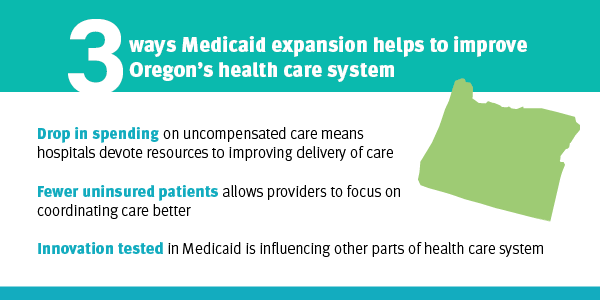
Medicaid Expansion Drives Improvements in Oregon’s Health Care System
By
04.14.2016
By now the benefits of Medicaid expansion are well known. In addition to providing health coverage to millions of Americans, it has helped create new health care jobs, decrease hospitals’ spending on uncompensated care, and generate budget savings for states. But another benefit is often overlooked: Medicaid expansion can help improve the quality of health care and reduce costs throughout a state’s entire health care system, not just in Medicaid.
Oregon is an example of how a state’s efforts to improve its health system can benefit from Medicaid expansion. In 2012, Oregon established Coordinated Care Organizations (CCOs) to provide health care to people in its Medicaid program. CCOs bring together different kinds of health providers and other community stakeholders to coordinate the care of beneficiaries in a specific geographic area in order to improve health outcomes and reduce costs.

To understand how Oregon’s Medicaid expansion model has helped its health care system, we spoke with representatives from Oregon’s Medicaid program, the Oregon Health Authority’s Transformation Center, and Care Oregon, which provides health plan services to four CCOs.
Medicaid expansion helped lower Oregon’s uninsured rate to 5 percent, which resulted in improvements to the state’s entire health system.
Through Medicaid expansion, Oregon was able to dramatically decrease the number of people who were uninsured. This reduction in the uninsured, in turn, aided the state’s efforts to better coordinate care:
- Hospitals had more resources to devote to improving how they delivered care, as they no longer needed to spend as much on uncompensated care for their uninsured patients.
- Fewer uninsured patients also freed up time for providers, especially safety-net providers, to focus on delivering better coordinated care. Previously, these providers spent a lot of time trying to help their uninsured patients gain access to affordable health care, leaving less time for coordinating their care.
Medicaid expansion changed the mix of beneficiaries in Medicaid
Prior to expansion, Oregon’s Medicaid program was focused on low-income children and pregnant women. Medicaid expansion extended coverage to a new mix of beneficiaries, including an increased number of adults, particularly men. This meant that the CCOs also needed to extend their strategies to address health issues that aren’t just of concern for women and children, including opioid dependence and diabetes.
With more people covered by Medicaid and a Medicaid population that was more diverse, the CCOs were able to take an approach that addresses the health needs of the whole population, instead of focusing on just a few demographic groups.
Together, health system improvement efforts and Medicaid expansion led to new and strengthened partnerships
Oregon’s CCOs are providing care to a much larger share of the total state population than they would have without expansion. Consequently, the efforts that the CCOs pursue are more likely to influence other payers.
For example, CCOs have been testing innovative ways of addressing the opioid epidemic. For instance, by creating pain clinics. As a result, CCOs have been approached by commercial payers to learn how to best address the epidemic. The coordinated care model has also already been expanded to the state employee health plan. There are ongoing discussions to bring it to private insurance as well.
A key to Oregon’s success is that the state envisioned Medicaid expansion and health system improvement as interdependent. Oregon expanded its Medicaid program with strong bipartisan support at a time when anti-Obamacare vitriol in the state was high. Support for Medicaid expansion was inextricably intertwined with enthusiasm for the new CCO model, which increased its chance of passage.
With then-Governor Kitzhaber’s strong leadership, Oregon lawmakers understood that near universal coverage was necessary to ensure that every Oregonian had access to key services like primary and preventive care. And lawmakers understood that without stable coverage and reliable access to care, people would continue to seek the wrong care at the wrong time, thus undermining meaningful health care delivery reform throughout the state and not just within Medicaid.
Oregon’s expansion program has helped create a forum for further health system improvement overall, where historic competitors can be brought together in a collaborative spirit. In the end, that’s a win-win for Medicaid patients and the entire state health care system.

